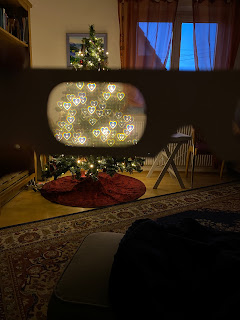In my last entry, the picture I shared from our 8th grade trip to Nuremberg was actually taken in the middle of Hitler's unfinished Kongresshalle, the location intended to be the heart of Nazi Party legislation for his Third Reich. The outside is massively impressive and the inside an unfinished mess. I'll spare you that obvious analogy because I instead want to talk about the power of place.
In addition to the Kongresshalle and Documentation Center, we took the kids to the Zeppelin Field, where the massive seats and podium still stand and you can actually stand in the same spot where Hitler gave his speeches during the Nazi Party Rallies of 1937 and 1938.
Zeppelin Field - then and now
Most of our kids were eager to stand on that dais, either with a triumphal arrogance over Hitler's failure in history or mere bragging rights when they got home to their parents. But my heart went out to the lone student who stayed away. Having lived in Germany all his life, he felt the power of the place we were standing in.
Because places do have power. We see its origin in Genesis with the Garden of Eden. Then Abraham is led to the Promised Land, to which Yahweh has to lead his descendants again through Moses after the Exodus. We can read as God sets ups his own dwelling place in a chosen spot, from the Tabernacle to the Temple in Jerusalem - a city that itself becomes a location beloved by many psalmists. Even Jesus weeps over this place. And in a way I'm jealous! I want to stand in a spot and to be able to declare: here is where God lives! To join the Psalmist of 84 "setting my heart on a pilgrimage" or rejoicing with the people in Psalm 122 who said "let's go to the house of the Lord."
Today, June 15, we end another year at Black Forest Academy, a place where 65 school years have passed before us and - we certainly hope - more are yet to come. I was sitting in the Auditorium a few weeks ago and reflecting on how that particular room held so many memories for me:
- the first graduation I witnessed in 2000 when we picked up Andi after his freshman year
- passing the microphone in a huge staff circle my first year teaching in 2009
- hiding backstage for 10 drama productions, mostly trying to keep 25 Middle Schoolers quiet
- crying with my friends, the Crooks, has they mourned the passing of their 1-month-old Jacalyn
- praying earnestly with a student for God's healing in his life only to witness it happening
- worshiping God as my brother spoke at Spiritual Emphasis Week
- and so many more
The Auditorium might not hold the same meaning for everyone, and that's when it began to dawn on me: places become significant because of who is in them.
Old Testament prophet Ezekiel is often connected with the Temple because of his many chapters of measurements. He's the same guy who also spoke on behalf of Yahweh when he recorded, "I will give you a new heart, and a new spirit I will put within you. ... You shall dwell in the land that I gave to your fathers, and you shall be my people, and I will be your God" (Ezekiel 36:26-28). It's the start of the promise that God's presence will move beyond the location of the Temple, fulfilled in John 1:14 when "the Word became flesh and dwelt (= tabernacled) among us." First among us, and then, after Acts 2, inside of us. I've referenced this term before, too, but it's as if we became Little Mobile Temples.
I love that. I reminds me that when I'm face to face with a brother or sister in Christ, I'm also in the presence of Yahweh, dwelling both in me and them. I'm not sure if it's okay to refer to fellow Christians as sacred places, but Peter seems to do it in 1 Peter 2:5 when he calls us "living stones being built up as a spiritual house." It teaches me that while it's okay to love certain places, I'm called, even commanded, to love people, especially my siblings in Christ. They are habitations of God's Spirit, the fulfillment of promises made to Abraham and Ezekiel, living stones with hearts of flesh. Together, we are made significant because of who is in us! The fulfillment of my desire to say "Here is where God lives!"





























